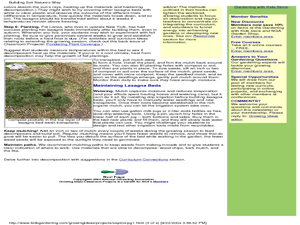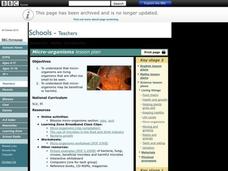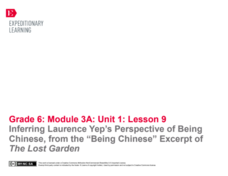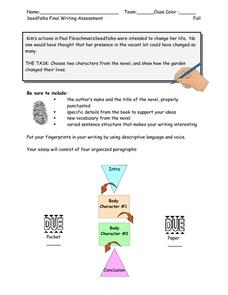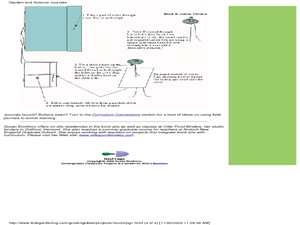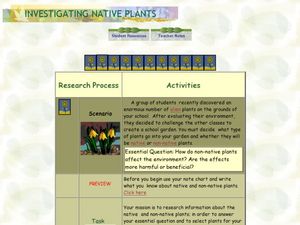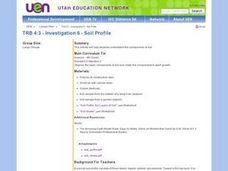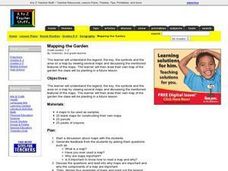Curated OER
Creating a Character Chart for the Secret Garden
The Secret Garden, is a wonderful book to read with your class. After reading, why not employ the lesson plan presented here as a follow up activity? In it, pupils create character charts that portray the tremendous changes that...
Curated OER
Building Soil Nature's Way: Exploring decomposition and soil health
Students explore decomposition and soil health by creating their own garden. In this agriculture activity, students build a "lasagna garden" with organic matter found in the area and plant perennials native to their region....
Curated OER
Flutter Farm
Students create their own butterfly garden and follow a participation plan to ensure that everyone will have a hand in the garden. In this gardening lesson, 5th graders log their progress with their garden by taking photos,...
Captain Planet Foundation
Energy Flow in the Garden
How can you tell what an owl has eaten? Study the food chain and flow of energy in an ecosystem by dissecting an owl pellet and noting the bones found inside. Additionally, the lesson includes a game about consumers and producers with a...
Curated OER
Micro-Organisms
Students investigate microscopic life by viewing video clips. In this organisms lesson plan, students view photographs and video clips on the internet of micro-organisms and discuss the harms and benefits of the creatures. ...
Curated OER
Garden Scavenger Hunt
Second graders examine the metric system. In this metric system instructional activity, 2nd graders compare measurements of common objects in metric units. Students compete in a garden scavenger hunt.
EngageNY
Introducing The Lost Garden and Finding Evidence of Laurence Yep’s Perspective on What It’s like to Fit into Another Culture on Pages 66– 67 of Dragonwings
How does culture shape perspective? Pupils consider the question as they read an excerpt from Laurence Yep's autobiography, The Lost Garden. Using a graphic organizer, they gather textual evidence and make inferences about the author's...
EngageNY
Inferring Laurence Yep’s Perspective of Being Chinese, from the “Being Chinese” Excerpt of The Lost Garden
It's all about perspective! Using the resource, scholars read a third excerpt from Laurence Yep's autobiography, The Lost Garden. As they read, individuals complete graphic organizers using clues from the text to infer the author's...
Curated OER
Exploring Texture In the Garden
Students explore the garden environment. In this garden environment lesson, students investigate the needs and parts of a plant. Students discover the differences between fruits and vegetables while creating their own garden.
Curated OER
Haiku: Observation and Writing in the Japanese Garden
Students observe a Botanical Gardens. Upon returning to the classroom, students write their own Haiku based on their observations.
Curated OER
Seedfolks Final Writing Assessment
Wrap up a study of Seedfolks with a final essay. Writers can draft their essays by following the steps and filling in the organizer provided here. The packet begins with a prompt, includes a few basic requirements, and provides an...
Curated OER
Pollination Power
Students go out into the garden and observe pollinating animals through hand lenses. In this pollination lesson plan, students also discuss how animals carry seeds to create new plants elsewhere.
Curated OER
How to Grow a Sunflower Plant
Learners explore botany by conducting a sunflower growth experiment. In this plant life lesson, students identify the anatomy of a sunflower plant and the essential nutrients it requires to grow. Learners utilize compost, soil, garden...
Curated OER
Making Field Journals
Students follow a bookmaking format to create a book and use it as a garden journal. In this science journal lesson plan, students follow book making directions to create a garden and science journal.
Captain Planet Foundation
Rotting Away
What happens at the end of a plant's life cycle? Show kids the natural way that plants show that they're decomposing, as well as the importance of compost, with a lesson about living organisms. After reading Log Cabin by Anne Schreiber,...
Captain Planet Foundation
Which Plant Is Which?
Learn about dichotomous keys, plant identification, and how to care for the planet with a lesson that includes several hands-on and innovative activities. Kids go on a plant scavenger hunt and classify the plants that they find...
Curated OER
Garden of Eden
Students view a video clip about animals and their habitats. They work together to discuss how different animals adapt to their environments. They create a new habitat for a specific animal and draw new adaptations for them.
Curated OER
Creating a Pollinator Garden
Students build a pollination garden. In this pollination lesson, students read directions and build a pollinator garden that will produce flowering plants for pollinator organisms to use in pollination of other plants.
Kenan Fellows
Sustainability: Learning for a Lifetime – Soil
Do great gardeners really have green thumbs—or just really great soil? Environmental scholars discover what makes Earth's soil and soil quality so important through research and experimentation. Learners also develop an understanding of...
Curated OER
Investigating Native Plants
Learners explore Earth science by participating in a gardening activity. In this botany lesson, students discuss a group of non-native plants that would grow well in a school garden. Learners complete a plant science graphic organizer...
Curated OER
Investigation 6 - Soil Profile
Fourth graders study the components of soil. They observe the basic components of soil and relate the components to plant growth. They record color, texture, and kinds of materials on their profile log (light color, denser, grittier -...
Curated OER
Biome Organizer Chart
In this biome organizer chart activity, students use the triangular chart to research and list the names of animals that live in the tundra, coniferous forest, deciduous forest, tropical rain forest, grasslands, and desert. Students fill...
Curated OER
Mapping the Garden
Students discuss maps, the features on a map, and why maps are important. They make a map of a garden they will be planting, complete with symbols that represent the various plants they choose to plant.
Curated OER
Mystery Caterpillar Challenge and IPM or Organic Gardening Practices
In this caterpillar worksheet, learners look at the picture of the caterpillar and identify what kind it is. Students then decide how to take care of it.



